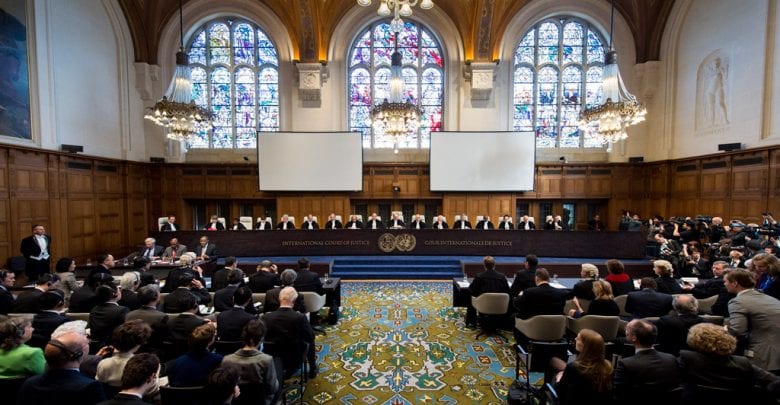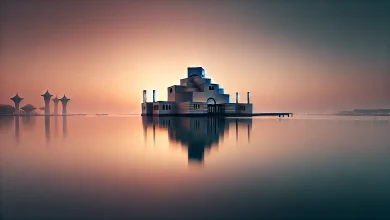
Iran files suit in international court against U.S. over sanctions
إيران تشكو الولايات المتحدة أمام محكمة العدل الدولية
AMSTERDAM (Reuters) – Iran has filed a lawsuit against the United States alleging that Washington’s decision in May to impose sanctions after pulling out of a nuclear deal violates a 1955 treaty between the two countries, the International Court of Justice said on Tuesday.
A State Department official said the application was without merit and the United States would fight it in the court.
“While we cannot comment on the specifics, Iran’s application is baseless and we intend to vigorously defend the United States before the ICJ,” a State Department official, who spoke on condition of anonymity, told Reuters.
President Donald Trump withdrew the United States from the 2015 nuclear pact with Iran reached by his predecessor Barack Obama and other world powers, and ordered tough U.S. sanctions on Tehran. Under the 2015 deal, which Trump sees as flawed, Iran reined in its disputed nuclear program under U.N. monitoring and won a removal of international sanctions in return.
The ICJ, which is based in The Hague and is also known as the World Court, is the United Nations tribunal for resolving international disputes. Iran’s filing asks the ICJ to order the United States to provisionally lift its sanctions ahead of more detailed arguments.
“Iran is committed to the rule of law in the face of U.S. contempt for diplomacy and legal obligations,” Iranian Foreign Minister Mohammad Javad Zarif said in a tweet on Monday, referring to Tehran’s lawsuit at the ICJ.
Iran said in its filing that Trump’s move “has violated and continued to violate multiple provisions” of the Treaty of Amity, Economic Relations and Consular Rights, signed long before the 1979 Islamic Revolution that ousted the U.S.-allied shah and triggered decades of hostile relations with Washington.
In a lawsuit filed by Iran in 2016 based on the same 1955 treaty, Washington argued that the ICJ had no jurisdiction. The court has scheduled hearings in that case in October.
The next step in Iran’s new lawsuit will be a hearing in which the United States is likely to contest whether it merits a provisional ruling. The court has not yet set a date, but hearings on requests for provisional rulings usually are heard within several weeks, with a decision coming within months.
Although the ICJ is the highest United Nations court and its decisions are binding, it has no power to enforce them, and countries – including the United States – have occasionally ignored them.
The specter of new U.S. sanctions, particularly those meant to block oil exports that are the lifeline of Iran’s economy, has caused a rapid fall in the Iranian currency and triggered street protests over fears economic hardships will soon
The Trump administration has indicated it wants a new deal with Iran that would cover the Islamic Republic’s regional military activities and ballistic missile program.
Iran has said both are non-negotiable, and the other signatories to the 2015 nuclear deal including major European allies Britain, France and Germany, as well as Russia and China, remain committed to it.
تبتّ محكمة العدل الدولية، الهيئة القضائية الأساسية لدى الأمم المتحدة، في شكوى قدمتها إيران ضدّ الولايات المتحدة في محاولة لوقف إعادة فرض عقوبات أميركية عليها، وذلك في جلسات تُفتتح الإثنين.
– ما هي القضية؟ –
في معركة قضائية جديدة تتواجه فيها طهران وواشنطن أمام محكمة العدل الدولية، تحاول إيران وقف العقوبات الأميركية التي أعاد الرئيس الأميركي دونالد ترامب فرضها.
وكان الرئيس الاميركي أعلن في مايو انسحاب بلاده من الاتفاق النووي المبرم بين إيران والقوى الدولية في 2015 والذي تم بموجبه تعليق العقوبات.
وقد وصف ترامب الاتفاق الذي التزمت طهران بموجبه بعدم حيازة الأسلحة الذرية، بأنه “فظيع” واختار إعادة فرض عقوبات أحادية الجانب مشددة.
وتتهم إيران الولايات المتحدة حالياً بأنها تفرض “حصاراً” على اقتصادها. وترغب الجمهورية الإسلامية في أن تأمر محكمة العدل الدولية ومقرها لاهاي، واشنطن بوقف الاجراءات موقتاً، قبل أن يصدر القضاة في ما بعد قرارهم بناء على وقائع القضية.
– مبادرة طهران شرعية؟ –
رأى أستاذ “تسوية الخلافات الدولية” في جامعية لايدن إريك دو بارباندير أن القضية تتضمن عنصرين، “أولاً، إيران تعتبر فعلاً أن إعادة فرض عقوبات انتهاكاً للقانون الدولي” وثانياً “من وجهة نظر سياسية، إيران تحظى بدعم العديد من الدول الاوروبية في مسألة العقوبات”.
وفي البداية، من المفترض أن يُقنع ممثلو إيران المحكمة أن قضاتها الـ15 الدائمين ومقرهم قصر السلام، يتمتعون فعليا بالسلطة القضائية للبتّ بالشكوى.
وتستند طهران في حججها إلى معاهدة غير معروفة كثيرا وقعتها إيران والولايات عام 1955 تنصّ على قيام “علاقات صداقة” بين البلدين وتشجع المبادلات التجارية والاستثمارات.
وبالرغم من وجود هذا النصّ، إلا أن إيران والولايات المتحدة قطعتا علاقاتهما الدبلوماسية منذ عام 1980.
– ما هي حجج واشنطن؟ –
بحسب إريك دو بارباندير، ستتحدث الولايات المتحدة عن عدم اختصاص محكمة العدل الدولية في هذه القضية.
وقد يلجأ ممثلو واشنطن إلى حجتين إحداهما تقول إن معاهدة 1955 لم تعد سارية لأنها “معاهدة صداقة” بين بلدين أصبحا خصمين منذ قرابة 40 عاماً.
أما الحجة الثانية فترتكز على أن الشكوى المقدمة لا تتعلق “بالمعاهدة إنما بالعقوبات وبالانشطة الارهابية المفترضة لايران”، بحسب دو بارباندير.
وأضاف “ستقول واشنطن بالتأكيد إن الشكوى تتعلق بأمر أكبر بكثير من معاهدة”، كطموحات طهران النووية مثلاً.
وأشار الأستاذ الجامعي إلى أن ثمة بنداً في معاهدة 1955 يسمح للولايات المتحدة باتخاذ “أي تدبير يهدف إلى حماية المصالح الأمنية الأساسية”.
– هل يمكن أن تربح إيران الدعوى؟ –
قال إريك دو بارباندير لوكالة فرانس برس “أعتقد أنه يُرجّح كثيراً أن تقرر محكمة العدل الدولية الاستماع إلى القضية استناداً إلى معاهدة 1955”.
لكن من الصعب معرفة ما إذا ستكون القضية ناجحة على أساس الوقائع الموضوعية، بمعنى آخر من الصعب تحديد ما إذا كانت الولايات المتحدة خرقت موجباتها القانونية أم لا.
واعتبر أن “نطاق معاهدة 1955 ضيّق نسبيا” مضيفا أن “محكمة العدل الدولية يمكن أن تبتّ فقط في ما إذا كانت الولايات المتحدة انتهكت موجباتها تجاه هذه المعاهدة تحديداً”.
ولن يكون لقضاة المحكمة الدولية الحق في النظر بما قد يُعتبر كشكوى أوسع بين البلدين.
وختم دو بارباندير بالقول إنه “من الصعب توقع” نتيجة الشكوى التي من المرجح ألا تُعرف قبل سنوات عدة.



